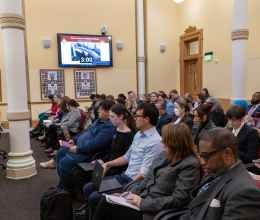
ACLU of Colorado Executive Director Nathan Woodliff-Stanley presented the following testimony to the Colorado Senate Judiciary Committee in opposition to SB 64, a bill that would have allowed death sentences to be given by non-unanimous juries. The bill was defeated.
Thank you, Madam Chair. My name is Nathan Woodliff-Stanley, Executive Director of the ACLU of Colorado, and I testify in opposition to Senate Bill 64.
There are only three states that currently allow non-unanimous juries in death penalty sentencing—Florida, Alabama and Delaware. Two of these states are considering legislation to require unanimous juries, and one is moving closer to ending the death penalty entirely. There is no reason for Colorado to be the only state moving in the other direction, possibly unconstitutionally, to allow non-unanimous juries in death penalty cases. Death is an irreversible punishment that should never be allowed under weaker standards than we require for something like shoplifting. Juries are already structurally biased toward death sentences because jurors have to be death-qualified, willing to give the death penalty, to even serve on a death penalty jury. If juries in Colorado have not been imposing the death penalty as often, perhaps that should be seen as a sign that we are moving away from a bad and broken system, not as a reason to make executions easier.
By nearly all accounts, the death penalty is useless as a deterrent, and in fact murder rates are higher in states using the death penalty than in those that do not. Even with unanimous juries, many innocent people across this nation have been given death sentences only to be exonerated many years later. The last thing we should be doing is increasing the likelihood of fatal mistakes here in Colorado.
Even apart from bigger-picture issues with the death penalty, there are many problems with non-unanimous juries. A non-unanimous sentence would be seen as less valid and more open to challenge. A non-unanimous jury is more likely to give death after a mistaken conviction, and in fact, Florida, with non-unanimous juries, has the highest rate of exonerations after mistaken death sentences in the country. We should not adopt legislation that will make it more likely to execute someone who is innocent, someone who is mentally ill, or someone who is marginalized or poor or who simply did not have good counsel. Please vote against Senate Bill 64.
